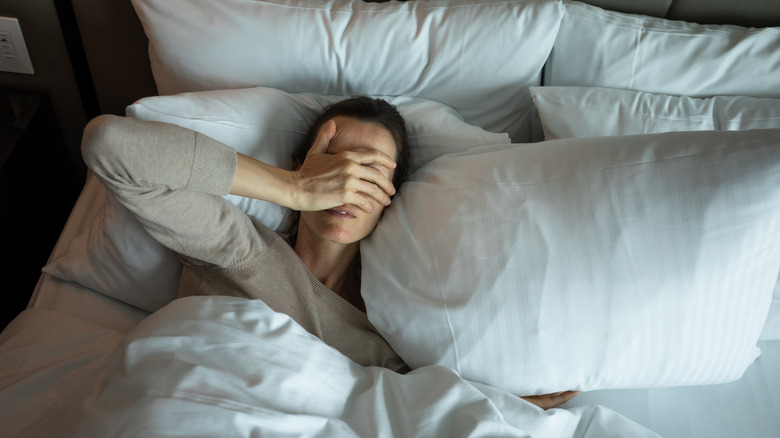Your Risk Of Dementia Goes Up If You Don't 'Flush Your Brain' While Sleeping
You've probably already noticed what happens to your day when you don't get the recommended 7 hours of sleep the night before. You might not be as alert as usual, or you may find yourself with a shorter fuse. A lack of sleep may show up as an inability to remember things or a lack of motivation to engage in your usual routine. Plus, poor sleep may affect your immune system, making you more susceptible to colds or flu.
Just like your body needs rest, your brain also needs rest from all that frenetic activity during the day (thinking can make your brain tired, too). Without consistent, adequate sleep during midlife, you may be putting yourself at a higher risk of dementia. In a 2021 study in Nature Communications, almost 8,000 people were tracked starting at midlife and followed for 25 years. Those who slept less than 6 hours during midlife had between a 22% and 37% higher risk of dementia than people who got at least 7 hours.
Without adequate sleep, your brain doesn't have a chance to flush out substances such as beta-amyloid proteins that accumulate during the day. According to Harvard Medical School, some researchers believe that these beta-amyloid proteins can clump together, forming plaques in the brain that can lead to forms of dementia such as Alzheimer's. And one stage of sleep is key in removing waste from the brain.
How deep sleep clears the brain
During sleep, your brain activates its own cleanup crew to clear away waste. Just like your lymphatic system removes toxins from the rest of your body, the brain relies on the glymphatic system to flush out substances that can become toxic over time. This system kicks into high gear during deep sleep, also known as slow-wave sleep. At this stage, brain cells shrink slightly, creating more space for fluid to flow through and carry waste out of the brain.
According to a 2020 article in Brain Sciences, problems with the glymphatic system may be linked to neurodegenerative diseases like dementia. People with Alzheimer's disease often have trouble sleeping, though it's not yet clear whether poor sleep contributes to the disease or is an early warning sign that appears before memory problems.
As we age, the glymphatic system naturally becomes less efficient. One reason is that the brain produces fewer water channel proteins known as AQP4, which help regulate the flow of fluid between brain cells and cerebrospinal fluid. Other age-related changes like weaker blood vessel pulsations and shallower breathing during sleep also slow glymphatic function. In Alzheimer's disease, AQP4 channels are often reduced or misplaced, making it harder for the brain to clear out beta-amyloid proteins, which then build up and accelerate brain damage.
Improving your glymphatic system and sleep
The 2020 article in Brain Sciences highlights several evidence-based lifestyle changes that can help your glymphatic system work more efficiently. For example, omega-3 fatty acids may support glymphatic function by reducing inflammation and helping keep AQP4 water channels properly positioned in the brain. Periodic fasting can also promote better placement of AQP4 channels by increasing a compound that regulates genes linked to glymphatic health.
Although most people shift positions throughout the night, sleeping more on your right side may enhance glymphatic clearance (BTW, sleeping on your back is linked to an increased dementia risk). Heavy alcohol use and chronic stress can impair the system, while regular exercise helps remove waste from the brain and protects against age-related cognitive decline.
Dementia risk may not be tied solely to glymphatic function and deep sleep. A 2017 study in Neurology found that REM sleep, the stage when most dreaming occurs, may also play a role. Each 1% drop in REM sleep was associated with a 9% higher risk of developing dementia. Improving REM and deep sleep often involves the same lifestyle habits that support glymphatic health, such as managing stress and limiting alcohol intake.
According to Harvard Medical School, consuming too much caffeine can interfere with REM sleep. On the other hand, regular exercise may increase deep sleep while slightly reducing REM sleep. Enhancing your overall sleep quality also means keeping a consistent sleep schedule and adopting a relaxing bedtime routine (here are some tricks you need to try if you can't fall asleep at night).


